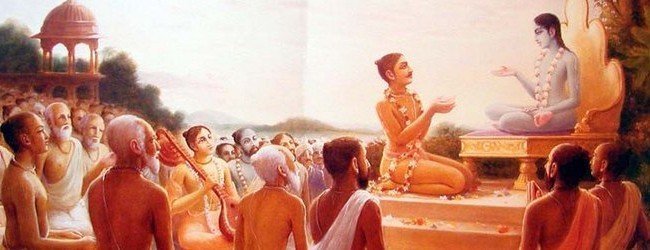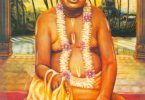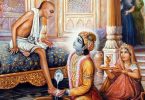Question: How would you explain the concept of “isavasya” given in Isopanisad?
Answer by Romapada Swami: I am not sure if you have some specific angle or point of clarification on this. The basic idea of ‘isavasya’ is to recognize the Lord’s proprietorship over everything, since everything in the universe including all spirit souls (us!) are emanations from Him, and therefore conducting our life accordingly.
When we recognize the Lord as proprietor, we would work only for His interest, and use everything at our disposal – including our body, our mental faculties, social relationships etc, in His service. We should take steps to mold our life in such a way that this becomes possible. This means being satisfied with whatever priveleges are given to us by God’s grace and not endeavor ever-increasingly for greater material gains (this is called prayasa, in the language of Upadesamrita, and it destroys bhakti). As Krishna says in the Gita, we are to perform our prescribed duties without claiming proprietorship over the results. One who is living by the principles of isavasya would not envy or covet the position or possessions of others but is satisfied to execute the duties given to him nicely to his utmost ability, for the pleasure of the Lord. Isavasya also implies conducting our activities according to the laws of God as given in Vedic scriptures, without being affected by undue attachments and aversions — in other words, we not only offer the results to Krishna but also do the work itself according to His directions, not whimsically.
Srila Prabhupada gives some examples of application of this idea in the purport to Isopanisad Mantra 1 – such as offering all our food to the Supreme Isa and accepting only Krishna prasadam. Another example is that a laborer cannot claim proprietorship over a building he has constructed simply because he worked hard to manufacture it. Thus a devotee does not think that he/she is being maintained or evaluated by the results of their own hard labor or personal abilities, rather one recognizes that all the ingredients including one’s physical and intellectual capabilities come from Krishna, and thus Krishna is the actual doer, proprietor and maintainer.
Srila Prabhupada often described nicely how young brahmacaris were trained within the Vedic system in this spirit within the Gurukula: the students would collect and bring alms for the Guru, and whatever they bring becomes the property of the spiritual master. The student will eat only when invited by the spiritual master and if the guru neglects to call him, he will fast; although it was the student that labored to collect the alms, he was trained to see it as Guru’s property and not think of eating without permission. Thus from the outset they are trained to later on see everything as the property of Guru and Krishna.







